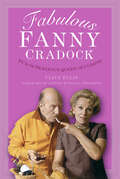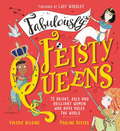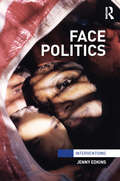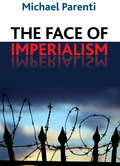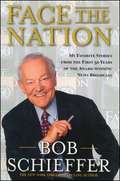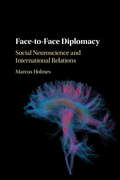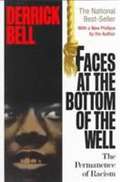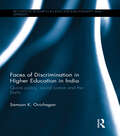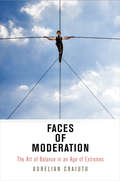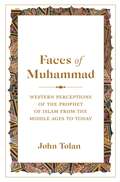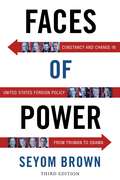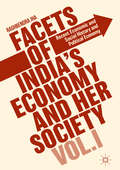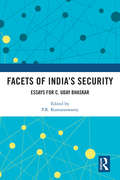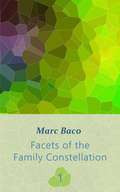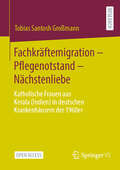- Table View
- List View
Fabulous Fanny Cradock: TV's Outrageous Queen of Cuisine
by Antony Worrall Thompson Clive EllisWhile Fanny Cradock berated Margaret Thatcher for wearing ‘cheap shoes and clothes’, wrote off Eamonn Andrews as a ‘blundering amateur’, and famously was forced to apologise for insulting another TV cook, her cookery programmes - which she presented in evening gown, drop ear-rings, pearls, and thick make-up, booming orders to her partner Johnnie, a gentle, monocled stooge who was portrayed as an amiable drunk, were watched by millions. They were hugely influential: the Queen Mother told Fanny that they were ‘mainly responsible’ for the improvement in catering standards since the war; Keith Floyd declared that ‘she changed the whole nation’s cooking attitudes’; for Esther Rantzen ‘she created the cult of the TV chef’. Lavishly illustrated, this is a fun, entertaining portrait of this infamous woman.
Fabulously Feisty Queens: 15 of the brightest and boldest women who have ruled the world
by Valerie WildingWho needs a Prince Charming when you're busy running the world?From ancient empresses and warrior queens, to fearsome pirates and modern-day monarchs, Fabulously Feisty Queens explores the lives and legacies of history's most powerful women.Made of stronger stuff than beauty and grace, discover just how bright, brave, brilliant and clever the world's female rulers have been throughout the centuries.With a foreword by historian and Chief Curator at Historic Royal Palaces, Lucy Worsley and illustrations by Pauline Reeves.
Face Politics (Interventions)
by Jenny EdkinsThe face is central to contemporary politics. In Deleuze and Guattari’s work on faciality we find an assertion that the face is a particular politics, and dismantling the face is also a politics. This book explores the politics of such diverse issues as images and faces in photographs and portraits; expressive faces; psychology and neuroscience; face recognition; face blindness; facial injury, disfigurement and face transplants through questions such as: What it might mean to dismantle the face, and what politics this might entail, in practical terms? What sort of a politics is it? Is it already taking place? Is it a politics that is to be desired, a better politics, a progressive politics? The book opens up a vast field of further research that needs to be taken forward to begin to address the politics of the face more fully, and to elaborate the alternative forms of personhood and politics that dismantling the face opens to view. The book will be agenda-setting for scholars located in the field of international politics in particular but cognate areas as well who want to pursue the implications of face politics for the crucial questions of subjectivity, sovereignty and personhood.
Face Recognition Technologies: Designing Systems that Protect Privacy and Prevent Bias
by Douglas Yeung Rebecca Balebako Carlos Ignacio Gutierrez Gaviria Michael ChaykowskyFace recognition technologies (FRTs) have many practical security-related purposes, but advocacy groups and individuals have expressed apprehensions about their use. This report highlights the high-level privacy and bias implications of FRT systems. The authors propose a heuristic with two dimensions -- consent status and comparison type -- to help determine a proposed FRT's level of privacy and accuracy. They also identify privacy and bias concerns.
Face of Imperialism
by Michael ParentiThe relationship between US economic and military power is not often considered within mainstream commentary. Similarly the connection between US military interventions overseas and US domestic problems is rarely considered in any detail. In this brilliant new book, Michael Parenti reveals the true face of US imperialism. He documents how it promotes unjust policies across the globe including expropriation of natural resources, privatisation, debt burdens and suppression of democratic movements. He then demonstrates how this feeds into deteriorating living standards in the US itself, leading to increased poverty, decaying infrastructure and impending ecological disaster. The Face of Imperialism redefines empire and imperialism and connects the crisis in the US with its military escapades across the world.
Face the Nation
by Bob SchiefferIn this engaging memoir of television news and its unique place in history, New York Times bestselling author and Face the Nation anchor Bob Schieffer takes us behind the scenes of the Sunday morning institution that has provided a window on the most memorable events of the last half-century.With his critically acclaimed memoir This Just In, Schieffer proved himself a natural storyteller, a gifted writer able to capture the workings of television news with remarkable wit and insight. Now Schieffer focuses his keen reporter's eye on 50 years of Face the Nation's live broadcasts and the historic moments the program has captured. From its 1954 debut, an interview with Senator Joe McCarthy the day before the Senate debate that would condemn him, to the broadcast's 1957 groundbreaking interview with a candid and controversial Nikita Khrushchev; from the brilliant analysis of communism made by guest Martin Luther King Jr. to the sometimes stunning, always revealing interviews with each sitting president; from the heroic and moving coverage of the terrorist attacks of September 11 to the revolutionary coverage of the war in Iraq, Schieffer shares unforgettable anecdotes about the guests, the stories and the events captured by the venerable public affairs program.Marked by the author's candid personal observations and wise, good humor, and featuring a special companion DVD of broadcast highlights created by CBS News for this edition, Bob Schieffer's look at 50 years of Face the Nation shines an entertaining and nostalgic light on America's presidents, culture, foreign policy and domestic affairs.
Face the Nation: My Favorite Stories from the First 50 Years of the Award-Winning News Broadcast
by Bob SchiefferIn this engaging memoir of television news and its unique place in history, New York Times bestselling author and Face the Nation anchor Bob Schieffer takes us behind the scenes of the Sunday morning institution that has provided a window on the most memorable events of the last half-century. With his critically acclaimed memoir This Just In, Schieffer proved himself a natural storyteller, a gifted writer able to capture the workings of television news with remarkable wit and insight. Now Schieffer focuses his keen reporter's eye on 50 years of Face the Nation's live broadcasts and the historic moments the program has captured. From its 1954 debut, an interview with Senator Joe McCarthy the day before the Senate debate that would condemn him, to the broadcast's 1957 groundbreaking interview with a candid and controversial Nikita Khrushchev; from the brilliant analysis of communism made by guest Martin Luther King Jr. to the sometimes stunning, always revealing interviews with each sitting president; from the heroic and moving coverage of the terrorist attacks of September 11 to the revolutionary coverage of the war in Iraq, Schieffer shares unforgettable anecdotes about the guests, the stories and the events captured by the venerable public affairs program. Marked by the author's candid personal observations and wise, good humor, Bob Schieffer's look at 50 years of Face the Nation shines an entertaining and nostalgic light on America's presidents, culture, foreign policy and domestic affairs.
Face-to-Face Diplomacy: Social Neuroscience and International Relations
by Marcus HolmesFace-to-face diplomacy has long been the lynchpin of world politics, yet it is largely dismissed by scholars of International Relations as unimportant. Marcus Holmes argues that dismissing this type of diplomacy is in stark contrast to what leaders and policy makers deem as essential and that this view is rooted in a particular set of assumptions that see an individual's intentions as fundamentally inaccessible. Building on recent evidence from social neuroscience and psychology, Holmes argues that this assumption is problematic. Marcus Holmes studies some of the most important moments of diplomacy in the twentieth century, from 'Munich' to the end of the Cold War, and by showing how face-to-face interactions allowed leaders to either reassure each other of benign defensive intentions or pick up on offensive intentions, his book challenges the notion that intentions are fundamentally unknowable in international politics, a central idea in IR theory.
Faces At the Bottom of the Well: The Permanence of Racism
by Derrick A. BellThe noted civil rights activist uses allegory and historical example to present a radical vision of the persistence of racism in America. These essays shed light on some of the most perplexing and vexing issues of our day: affirmative action, the disparity between civil rights law and reality, the "racist outbursts" of some black leaders, the temptation toward violent retaliation, and much more.
Faces at the Bottom of the Well
by Derrick BellThe noted civil rights activist uses allegory and historical example to present a radical vision of the persistence of racism in America. These essays shed light on some of the most perplexing and vexing issues of our day: affirmative action, the disparity between civil rights law and reality, the "racist outbursts" of some black leaders, the temptation toward violent retaliation, and much more.
Faces of Discrimination in Higher Education in India: Quota policy, social justice and the Dalits (Routledge Research in Educational Equality and Diversity)
by Samson K. OvicheganThis book illuminates the experiences of a set of students and faculty who are members of the Dalit caste – commonly known as the ‘untouchables’ – and are relatively ‘successful’ in that they attend or are academics at a prestigious university. The book provides a background to the study, exploring the role of caste and its enduring influence on social relations in all aspects of life. The book also contains a critical account of the current experiences of Dalit students and faculty in one elite university setting – the University of Shah Jahan (pseudonym). Drawing on a set of in-depth semi-structured interviews, the empirical study that is at the centre of this book explores the perceptions of staff and students in relation to the Quota policy and their experiences of living, working and studying in this elite setting. The data chapters are organised in such a way as to first explore the faculty views. The experiences of students are then examined with a focus on the way in which their caste is still an everyday part of how they are sometimes ‘othered’. Also, a focus on female Dalit experiences attempts to capture the interconnecting aspects of abject discrimination in their university life. Faces of Discrimination in Higher Education in India explores: critical exploration of the Quota System policy and related social justice issues; faculty voices: Quota, caste and discrimination; students’ perceptions and experiences of the Quota policy; being a ‘female Dalit’ student; positioning caste relations and the Quota policy: a critical analysis. This study will be of interest to educational sociologists examining policies in education and analysts of multicultural and South Asian studies. It will also steer pertinent discussions on equality and human rights issues.
Faces of Internationalism: Public Opinion and American Foreign Policy
by Eugene R. WittkopfIn Faces of Internationalism, Eugene R. Wittkopf examines the changing nature of public attitudes toward American foreign policy in the post-Vietnam era and the role that public opinion plays in the American foreign policymaking process. Drawing on new data--four mass and four elite opinion surveys undertaken by the Chicago Council of Foreign Relations from 1974 to 1986--combined with sophisticated analysis techniques, Wittkopf offers a pathbreaking study that addresses the central question of the relationship of a democracy to its foreign policy.The breakdown of the "consensus" approach to American foreign policy after the Cold War years has become the subject of much analysis. This study contributes to revisionist scholarship by describing the beliefs and preferences that have emerged in the wake of this breakdown. Wittkopf counters traditional views by demonstrating the persistence of U.S. public opinion defined by two dominant and distinct attitudes in the post-Vietnam war years--cooperative and militant internationalism.The author explores the nature of these two "faces" of internationalism, focusing on the extent to which elites and masses share similar opinions and the political and sociodemographic correlates of belief systems. Wittkopf also offers an original examination of the relationship between beliefs and preferences.
Faces of Moderation: The Art of Balance in an Age of Extremes
by Aurelian CraiutuAristotle listed moderation as one of the moral virtues. He also defined virtue as the mean between extremes, implying that moderation plays a vital role in all forms of moral excellence. But moderation's protean character—its vague and ill-defined omnipresence in judgment and action—makes it exceedingly difficult to grasp theoretically. At the same time, moderation seems to be the foundation of many contemporary democratic political regimes, because the competition between parties cannot properly function without compromise and bargaining. The success of representative government and its institutions depends to a great extent on the virtue of moderation, yet the latter persists in being absent from both the conceptual discourse of many political philosophers and the campaign speeches of politicians fearful of losing elections if they are perceived as moderates.Aurelian Craiutu aims to resolve this paradox. Examining the writings of prominent twentieth-century thinkers such as Raymond Aron, Isaiah Berlin, Norberto Bobbio, Michael Oakeshott, and Adam Michnik, he addresses the following questions: What does it mean to be a moderate voice in political and public life? What are the virtues and limits of moderation? Can moderation be the foundation for a successful platform or party? Though critics maintain that moderation is merely a matter of background and personal temperament, Craiutu finds several basic norms that have consistently appeared in different national and political contexts. The authors studied in this book defended pluralism, of ideas, interests, and social forces, and sought to achieve a sound balance between them through political trimming. They shared a preoccupation with political evil and human dignity, but refused to see the world in Manichaean terms that divide it neatly into the forces of light and those of darkness. Faces of Moderation argues that moderation remains crucial for today's encounters with new forms of extremism and fundamentalism across the world.
Faces of Muhammad: Western Perceptions of the Prophet of Islam from the Middle Ages to Today
by John TolanHeretic and impostor or reformer and statesman? The contradictory Western visions of MuhammadIn European culture, Muhammad has been vilified as a heretic, an impostor, and a pagan idol. But these aren’t the only images of the Prophet of Islam that emerge from Western history. Commentators have also portrayed Muhammad as a visionary reformer and an inspirational leader, statesman, and lawgiver. In Faces of Muhammad, John Tolan provides a comprehensive history of these changing, complex, and contradictory visions. Starting from the earliest calls to the faithful to join the Crusades against the “Saracens,” he traces the evolution of Western conceptions of Muhammad through the Reformation, the Enlightenment, and the nineteenth and twentieth centuries, and up to the present day.Faces of Muhammad reveals a lengthy tradition of positive portrayals of Muhammad that many will find surprising. To Reformation polemicists, the spread of Islam attested to the corruption of the established Church, and prompted them to depict Muhammad as a champion of reform. In revolutionary England, writers on both sides of the conflict drew parallels between Muhammad and Oliver Cromwell, asking whether the prophet was a rebel against legitimate authority or the bringer of a new and just order. Voltaire first saw Muhammad as an archetypal religious fanatic but later claimed him as an enemy of superstition. To Napoleon, he was simply a role model: a brilliant general, orator, and leader.The book shows that Muhammad wears so many faces in the West because he has always acted as a mirror for its writers, their portrayals revealing more about their own concerns than the historical realities of the founder of Islam.
Faces of Power
by Seyom BrownSeyom Brown's authoritative account of U.S. foreign policy from the end of the Second World War to the presen
Faces of Power: Constancy and Change in United States Foreign Policy from Truman to Obama
by Seyom BrownSeyom Brown's authoritative account of U.S. foreign policy from the end of the Second World War to the present challenges common assumptions about American presidents and their struggle with power and purpose. Brown shows Truman to be more anguished than he publicly revealed about the use of the atomic bomb; Eisenhower and George W. Bush to be more immersed in the details of policy formulation and implementation than generally believed; Reagan to be more invested in changing his worldview while in office than any previous president; and Obama to have modeled his military exit from Iraq and Afghanistan more closely to Nixon and Kissinger's exit strategy from Vietnam than he would like to admit. Brown's analyses of Obama's policies for countering terrorist threats at home and abroad, dealing with unprecedented upheavals in the Middle East, preventing the proliferation of nuclear weapons, and containing new territorial expansion by China and Russia reinforce the book's "constancy and change" theme, which shows that serving the interests of the most powerful country in the world transforms the Oval Office's occupant more than its occupant can transform the world.Praise for previous editions:"Systematic and informative... [Brown] has a gift for clear analysis that makes his book a useful contribution to the Cold War literature."—The Journal of American History"Comprehensive and clear... thorough without ever becoming dull, providing detailed analysis of decisions while never neglecting the environment within which they are made."—International Affairs"An excellent reference for those interested in United States foreign policy.... Well-written and well-researched, it is appropriate for use in both undergraduate and graduate courses."—International Journal"An analysis with difference—an important difference. Seyom Brown discusses United States policy from the perspective of how decision makers in the United States viewed their adversaries and the alternatives as those decision makers saw them.... Well worth the effort of a careful reading."—American Political Science Review
Faces of Power: Constancy and Change in United States Foreign Policy from Truman to Obama, third edition
by Seyom BrownSeyom Brown's authoritative account of U.S. foreign policy from the end of the Second World War to the presen
Facetas de las Constelaciones Familiares 1
by Marc BacoDescripción breve Este libro es una recopilación de mis anteriores publicaciones en el blog (a partir del 27.7.2015) en www. marcbaco. de complementado con los principios básicos de las constelaciones familiares en mi folleto informativo "Consetalciones de familia - completamente práctica". También puedes leer la mayor parte de forma gratuita en mi página web si te apetece. Índice de contenidos Prólogo Qué ocurre durante una constelación familiar Charla preliminar Selección de los representantes Constelación real Discusión final Terminación de una constelación Excursus Reglas del juego Aclarar el árbol genealógico y los vínculos familiares Ropa y apariencia Artículo de blog de wwwmarc.baco.de ¿Cómo se beneficia usted, como representante, de una constelación? ¿Qué tiene que ver la madre de Hitler con las constelaciones familiares? ¿Se te permite ser feliz en absoluto? ¿Para qué sirve el círculo de hermanos? Cómo una constelación de cuento de hadas revela el guión de tu vida Constelaciones con la "relación ser Para quien es especialmente importante ser un "representante permanente Microexpresiones: lo que revelan las expresiones faciales fugaces al constelador familiar Cómo la línea ancestral te lleva a tu poder Constelaciones del trauma: cómo la energía reprimida puede finalmente fluir Lo rápido que una constelación de sueños puede convertirse en una constelación de traumas ¿Puede ayudarle una constelación de bienestar? Cómo pueden confundirle las escisiones Por qué el deseo de morir no tiene que estar relacionado con uno mismo Constelaciones internas del equipo: Quién mueve realmente los hilos dentro de ti Cómo puede dejar de lado incluso los papeles más difíciles Lo que refuerza tu autoestima en las constelaciones y en casa Las constelaciones energéticas y el camino de la solución a través de los arcángeles Trauma prenatal: cómo influyen las experiencias en el
Facets of India's Economy and Her Society Volume I: Recent Economic And Social History And Political Economy
by Raghbendra Jha‘Jha is the right scholar and economist to take readers through the development of the Indian economy. Readers will be in good hands.’—Edmund Phelps, Columbia University, USA, and winner of the 2006 Nobel Prize in Economics‘This is perhaps the best and most scholarly contribution to understanding the Indian Economy and Society. Its rich historical perspective and a profound understanding of how India has evolved into a major economic power set standards of scholarship and analytical rigour that will be hard to surpass". —Raghav Gaiha, University of Manchester, UK‘Linking of economy and society is increasingly recognised as essential for addressing policy challenges by the current phase of globalisation. As such this study should be valuable not just for those studying India, but also for those interested in global developments.’—Mukul Asher, National University of Singapore, Singapore‘This book is a tour-de-force review of the fundamental topics on the Indian political economy and society that are relevant for any committed social scientist to be aware of.’—Sumit K. Majumdar, University of Texas at Dallas, USAThis two-volume work provides an account of how India has been meeting its myriad of economic, political and social challenges and how things are expected to evolve in the future. Despite enormous challenges at the time of independence, India chose to address them within a secular, liberal, democratic framework, which guaranteed several fundamental rights. Challenges included intense mass poverty and hunger, very poor literacy and educational abilities of the population, the task of uniting a country with scores of languages and ethnicities ruled by different entities for decades and persistent threats of external aggression, to name just a few. Over time, incomes and opportunities have expanded enormously and India has regained her self-confidence as a nation. In this first volume, Jha presents a long view of the performance of the Indian economy and discusses key aspects of India’s population, land and labor. In addition, the Indian Constitution and basic structure of governance are analysed within the context of major economic and political developments in independent India.
Facets of India’s Security: Essays for C. Uday Bhaskar
by P. R. KumaraswamyThis volume brings together established and emerging scholars from academia and think tanks to reflect on important, conceptual, strategic and developmental issues in India’s national security. It provides a comprehensive understanding of national security through a more open approach, covering both traditional and non-traditional concerns that have a bearing on the survival and well-being of humanity. It discusses key themes such as perceptions about China, civil-military relations, gender and military, nuclear safety, arms trade and cybersecurity, human security, food and water security, soft power and the media's role in covering security issues. As a festschrift for Commodore C. Uday Bhaskar, it highlights and adds to his scholarly contributions to the national security debate in the country for the past three decades. A unique contribution, this volume will be indispensable for students and researchers of politics and international relations, national security, human security, geopolitics, non-traditional security, military and strategic studies, and South Asian studies.
Facets of Security in the United Arab Emirates (Europa Country Perspectives)
by William GuéraicheThe United Arab Emirates (UAE) has elaborated its own philosophy of security. Driven by emergencies and increasing risks, both in the region and globally, Emirati authorities have developed a sense of anticipation as well as an agility to react promptly to new threats through the ability to assess the risks in any given situation. War and the avatars of conflict are a constant reality in the Middle East. Transnational threats, including the regional context, the war in Yemen, insecurity in the Levant and tensions with Iran affect the overall stability of the Peninsula and consequently that of the UAE. Owing to the inclusion of the UAE in the networks of globalization, non-traditional security issues are not relegated to the background. Issues such as COVID-19, immigration, cybersecurity and human trafficking need to be addressed domestically as well as globally. This volume offers a comprehensive and multifaceted examination of the traditional and non-traditional security measures present in the UAE that allow the country to remain politically stable in an otherwise volatile region, and aims to offer a comprehensive overview of all forms of security in the UAE.
Facets of the Family Constellation -- Volume 1
by Marc BacoThis is a highly readable guide to the powerful family constellations method of therapy, which is based on recreating family patterns within the therapeutic context.
Facettes des Constellations Familiales 1
by Marc BacoTable des matières Avant-propos Que se passe-t-il dans une constellation familiale Entretien préliminaire Sélection des représentants Déroulement réel Discours final Annulation d'une constellation Règles de digression du jeu Clarification de l’arbre généalogique et des liens familiaux Vêtements et apparence Article de blog de wwwmarc.baco.de Comment tirer le meilleur parti d'une constellation en tant que représentant ? Qu'est-ce que la mère d'Hitler a à voir avec les constellations familiales ? Dois-tu absolument être heureux ? A quoi sert la fratrie ? Comment une constellation de conte de fées révèle votre scénario de vie Constellations avec « l’Etre de relationnel » Pour qui il est particulièrement important d'être « représentant permanent » Micro expressions - ce que les expressions faciales éphémères révèlent au constellateur familial Comment la lignée d'ascendance te permet d'accéder à ta force. Constellations de traumatismes - Comment l'énergie refoulée peut enfin s'écouler À quelle vitesse une constellation de rêves peut-elle devenir une constellation de traumatismes Une constellation de bien-être peut-elle t’aider ? Comment les séparations peuvent te troubler Pourquoi le désir de la mort n'est pas forcement lié à toi-même Constellations de l'équipe interne : qui tire réellement les ficelles en toi Comment abandonner même les rôles les plus difficiles Dans les constellations et à la maison qu’est-ce qui renforce ton estime de soi Constellation énergétique et chemin de la solution à travers les archanges Traumatisme prénatal - Comment les expériences dans le ventre maternel
Fachkräfteengpässe im Wissenschaftssystem: Risiken für die Innovationsdynamik in Deutschland?
by Bernd Kriegesmann Ariane GrohDieses Buch greift die Fachkräftemangeldiskussion im Wissenschaftssystem auf und analysiert die Auswirkungen auf die Innovationsdynamik in Deutschland. Besonders in Disziplinen, die für die Bewältigung großer gesellschaftlicher Herausforderungen wichtig sind, wird es zunehmend schwierig, wissenschaftliches Personal zu gewinnen. Der Wettbewerb mit der Wirtschaft um hochqualifizierte Fachkräfte verschärft diese Engpässe. Ohne Lösungen drohen erhebliche Auswirkungen für Forschung und Innovation. Das Buch bietet Entscheidungsträgern in Wissenschaft und Politik fundiertes Orientierungswissen. Es analysiert die Fachkräftesituation, prognostiziert zukünftige Entwicklungen und zeigt Maßnahmen auf, um die Engpässe zu überwinden. Der Inhalt Fachkräfte und Innovation Wissenschafts- und Innovationssysteme Fachkräfte-Zukunftsperspektive Attraktivität der wissenschaftlichen Karriere
Fachkräftemigration – Pflegenotstand – Nächstenliebe: Katholische Frauen aus Kerala (Indien) in deutschen Krankenhäusern der 1960er
by Tobias Santosh GroßmannDieses Open-Access-Buch verfolgt das Ziel, die Migrationsbewegungen aus Indien in den 1960er Jahren anhand transdisziplinärer Ansätze der Historischen Migrationsforschung aufzuarbeiten. In der jungen Bundesrepublik führte der Wirtschaftsboom der Nachkriegszeit zur Modernisierung und zum Ausbau von Pflegeeinrichtungen. Dabei entstand eine kaum zu stillende geschlechtsspezifische Nachfrage nach Arbeitskräften: Frauen, die Krankenpflege als „Berufung“ ausüben sollten. Katholische Orden reagierten auf den Pflegenotstand ihrer Krankenhäuser, indem sie ab 1960 über internationale Kirchennetzwerke Ordenskandidatinnen aus dem christlich geprägten Kerala in Südindien anwarben. Der deutsche Staat wurde auf dieses innerkirchliche Modell aufmerksam. Ab 1964 wurden auf Anweisung des Innenministers von Baden-Württemberg in der hybriden „Nirmala-Aktion“ zwischen Staats- und Kirchenrecht durch katholische Akteure „indische Mädchen“ aus Kerala für staatliche Pflegeeinrichtungen rekrutiert. Die ersten Migrationsbewegungen transformierten sich bald zu einer Kettenmigration, bei der über Jahre hinweg mehrere tausend Frauen in den deutschen Pflegesektor migrierten. Der Rekonstruktion aus institutioneller Perspektive werden die subjektiven Erinnerungen von Pioniermigrantinnen gegenübergestellt. Die Einordnung in die historischen Kontexte der Empfänger- und Senderregion ermöglicht neue Sichtweisen auf die transnationalen Entwicklungen, welche Kerala und Deutschland seit den 1960ern verbinden.
